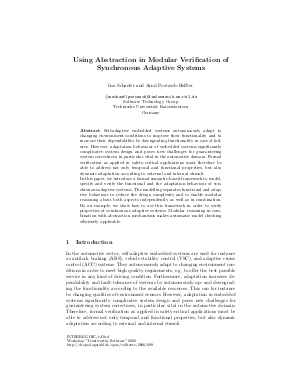Using Abstraction in Modular Verification of Synchronous Adaptive Systems
Authors Ina Schaefer, Arnd Poetzsch-Heffter
-
Part of:
Volume:
Workshop on Trustworthy Software (TrustworthySW 2006)
Part of: Series: Open Access Series in Informatics (OASIcs) - License:
 Creative Commons Attribution-NonCommercial-NoDerivs 3.0 Unported license
Creative Commons Attribution-NonCommercial-NoDerivs 3.0 Unported license
- Publication Date: 2006-09-26
File

PDF
OASIcs.TrustworthySW.2006.699.pdf
- Filesize: 375 kB
- 14 pages
Document Identifiers
Subject Classification
Keywords
- Dependable Embedded Systems
- Self-Adaptation
- Abstraction
- Modular Verification
Metrics
- Access Statistics
-
Total Accesses (updated on a weekly basis)
0Document
0Metadata
Abstract
Self-adaptive embedded systems autonomously adapt to changing environment conditions to improve their functionality and to increase their dependability by downgrading functionality in case of fail- ures. However, adaptation behaviour of embedded systems significantly complicates system design and poses new challenges for guaranteeing system correctness, in particular vital in the automotive domain. Formal verification as applied in safety-critical applications must therefore be able to address not only temporal and functional properties, but also dynamic adaptation according to external and internal stimuli. In this paper, we introduce a formal semantic-based framework to model, specify and verify the functional and the adaptation behaviour of syn- chronous adaptive systems. The modelling separates functional and adap- tive behaviour to reduce the design complexity and to enable modular reasoning about both aspects independently as well as in combination. By an example, we show how to use this framework in order to verify properties of synchronous adaptive systems. Modular reasoning in com- bination with abstraction mechanisms makes automatic model checking efficiently applicable.
Cite As Get BibTex
Ina Schaefer and Arnd Poetzsch-Heffter. Using Abstraction in Modular Verification of Synchronous Adaptive Systems. In Workshop on Trustworthy Software. Open Access Series in Informatics (OASIcs), Volume 3, pp. 1-14, Schloss Dagstuhl – Leibniz-Zentrum für Informatik (2006)
https://doi.org/10.4230/OASIcs.TrustworthySW.2006.699
BibTex
@InProceedings{schaefer_et_al:OASIcs.TrustworthySW.2006.699,
author = {Schaefer, Ina and Poetzsch-Heffter, Arnd},
title = {{Using Abstraction in Modular Verification of Synchronous Adaptive Systems}},
booktitle = {Workshop on Trustworthy Software},
pages = {1--14},
series = {Open Access Series in Informatics (OASIcs)},
ISBN = {978-3-939897-02-6},
ISSN = {2190-6807},
year = {2006},
volume = {3},
editor = {Autexier, Serge and Merz, Stephan and van der Torre, Leon and Wilhelm, Reinhard and Wolper, Pierre},
publisher = {Schloss Dagstuhl -- Leibniz-Zentrum f{\"u}r Informatik},
address = {Dagstuhl, Germany},
URL = {https://drops.dagstuhl.de/entities/document/10.4230/OASIcs.TrustworthySW.2006.699},
URN = {urn:nbn:de:0030-drops-6996},
doi = {10.4230/OASIcs.TrustworthySW.2006.699},
annote = {Keywords: Dependable Embedded Systems, Self-Adaptation, Abstraction, Modular Verification}
}
